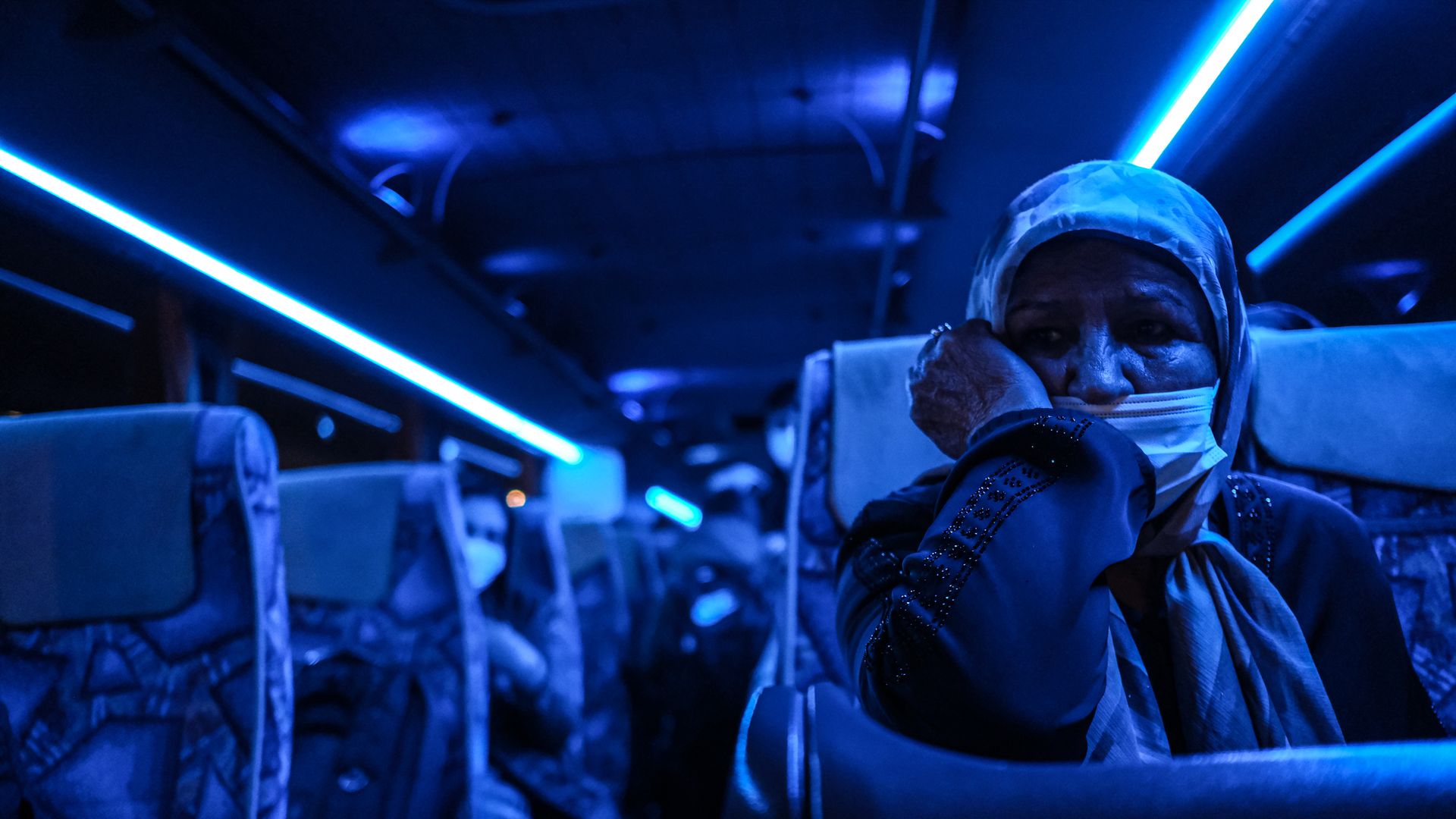Scoop: U.S. begins denying Afghan immigrants
Add Axios as your preferred source to
see more of our stories on Google.

Afghan refugees on a bus bound for temporary housing after arriving in Greece. Photo: Byron Smith/Getty Images
The Biden administration has begun issuing denials to Afghans seeking to emigrate to the United States through the humanitarian parole process, after a system that typically processes 2,000 applications annually has been flooded with more than 30,000.
Why it matters: Afghans face steeper odds and longer processes for escaping to the U.S., despite the earlier sweeping efforts by the Biden administration to assist its allies. Immigration lawyers and advocacy groups say the government has set untenable barriers to a safe haven in the U.S.
- Humanitarian parole has already been used for tens of thousands of Afghans.
Driving the news: U.S. Citizenship and Immigration Services has started issuing the humanitarian parole denials, according to multiple immigration attorneys and advocates.
- More than 100 Afghans have been approved since the summer, one Homeland Security official confirmed.
- Now, there reportedly are dozens of denials, too.
One denial letter obtained by Axios calls for "documentation from a third-party source specifically naming the beneficiary, and outlining the serious harm they face."
- Immigration lawyers and advocacy groups say that threat standard is untenable, given the circumstances in Afghanistan.
- They hoped the administration would utilize the parole process to allow fast-track pathways for even more Afghans to enter the United States.
- A 2017 USCIS training manual "explicitly provides instruction that they may grant parole to individuals who are facing fear of harm due to generalized violence," Jill Marie Bussey, Director for Public Policy at Lutheran Immigration and Refugee Service, told Axios.
- "They’re failing to utilize the power of their own guidance to protect Afghans."
The other side: Those who've already received humanitarian parole include immigrants who hadn't yet received their Special Immigrant Visas or other legal protections when they were airlifted from Afghanistan after the Taliban took control of Kabul.
- Humanitarian parole gives recipients a two-year stopgap in the U.S. to complete their application for more formal programs like asylum, refugee status or an SIV.
- Two administration officials told Axios the program was never intended as a workaround to the established refugee resettlement program or Operation Allies Welcome, which has brought roughly 75,000 vulnerable Afghans to the U.S. — and counting.
- It's intended only for people in extreme circumstances who are not included in the operation, and are unable to wait for refugee resettlement.
By the numbers: Of those who've already been evacuated from Afghanistan and brought to the U.S., nearly 5,000 are American citizens, according to data provided to Axios on Tuesday evening. More than 3,000 are green card holders.
- 75,000 are Afghans — of which more than 2-in-5 are eligible for SIVs due to their or their family member's aid to the U.S. government in Afghanistan.
- Others are family members of U.S. citizens and green card holders, journalists, human rights activists or other at-risk humanitarian workers.
- Roughly 35,000 evacuees are waiting at military bases in the U.S., while another 36,000 are home in the states or resettling into new U.S. communities.
- Another 3,200 evacuees are still on sites overseas waiting to be brought into the U.S.
What to watch: The historic airlift from Afghanistan ended with the full withdrawal of U.S. troops, but the State Department has continued to locate and evacuate some Afghan allies through Operation Allies Welcome.
- Since the Aug. 31 withdrawal deadline, officials have evacuated 479 U.S. citizens, 450 green card holders, their families and an undisclosed number of SIV holders, according to a State Department official.
- Altogether, around 2,800 have been evacuated on U.S.-chartered flights. There are enormous challenges, including the fact the Kabul airport is not yet fully operational, and expected winter weather at its high elevation.
- They aim to ramp up efforts to evacuate 1,000 SIV holders and certain applicants each month to third-party countries for final processing and vetting — as long as applicants have reached a far-enough step in the process.

